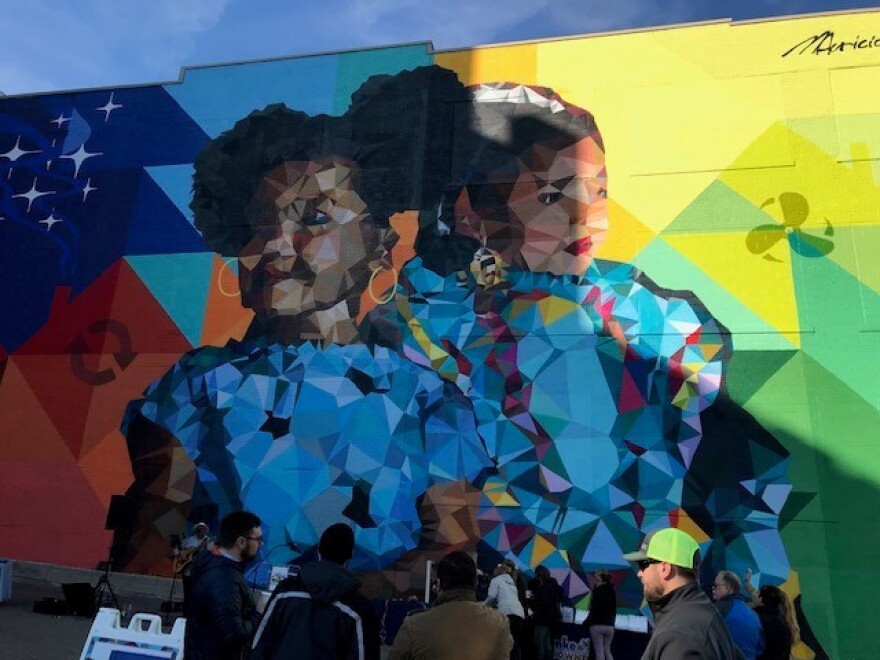We’re living in an era when more people need a helping hand due to the COVID-19 pandemic.
We received several Bubbler Talk questions wondering how people needing help during the coronavirus pandemic can find resources. So, we spoke with three groups that are supporting people in the Milwaukee area — now and after the pandemic.
>>Latest WUWM & NPR Coronavirus Coverage
Hunger Task Force
The Hunger Task Force distributes food — much of it donated — through food pantries, meal programs and schools. Pre-COVID-19 it gave away more than 30 million pounds a year, distributing through partnering nonprofits in 36 eastern Wisconsin counties.
But the coronavirus pandemic turned Hunger Task Force operations upside down. Volunteers had to stay home, so the staff is filling the gap. For example, the task force's Stockbox program. Hunger Task Force employees, all wearing masks and gloves, are still giving seniors the nutritious food they need — just as a drive-thru service.
“Beulah Brinton [Community Center] would normally be open as a senior dining site. What’s different is that nobody can go inside. They’re just picking up a box of food and going back home and being safe,” says Hunger Task Force Executive Director Sherrie Tussler.

She says the pandemic also meant rethinking the way Hunger Task Force supplies food to pantries. Since some pantries were closed due to the safer-at-home order, they were struggling to get food to people.
"A lot of people who became recently unemployed immediately went to a food pantry rather than a grocery store, so pantries were getting food and handing out food as fast as they got it," Tussler says. "So, we started building what we call the 'family box' to reduce the work of the pantry volunteers so they could just hand the box to somebody."
But there has been a silver lining. Tussler says Hunger Task Force has received an outpouring of donations.
“People were so generous that we decided we would commit $1 million to purchasing milk and cheese products from Wisconsin farmers and farm cooperative and dairy producers — so we could not only prevent the spilling of milk but get that milk to hungry people,” Tussler says.
Hunger Task Force is distributing the dairy products to every Wisconsin county.
IMPACT
Call 2-1-1 any time, day or night, and a real person can help answer questions about food, utilities, housing and other social services.
"Think about it — I don’t know where my next meal is coming from or I have an 11-year-old daughter and I don’t know how to help her. Those are the most serious of life situations,” says IMPACT President and CEO John Hyatt.

Hyatt says his team helps people in southeastern Wisconsin find helpful programs.
"We have a resource database. Locally, we’ve got about have 5,000 programs and services. Then, because there are all of these 211s on the same platform, we have access to 25,000 different programs and services statewide,” Hyatt says.
He says COVID-19 is hitting people who typically don't need social services, including residents in the suburbs.
"Those calls are up and it’s not surprising — income down, worries are up and that’s when people start calling," Hyatt says.
Community Advocates
Community Advocates helps sort out rent and utility issues. It also specializes in homeless services and working with women over 50 who are suffering from abuse.
Also, the organization operates the Milwaukee Women’s Center, an emergency shelter for domestic violence survivors and families experiencing homelessness.

CEO Andi Elliott recalls one of the first calls she took at the onset of the pandemic.
"I spoke with a woman who had had two jobs and both shut down related to COVID. She went to apply for unemployment and was told she had an unemployment forfeiture she wasn’t aware of,” Elliott says.
So, Elliott referred her to the Legal Aid Society. “Then we can help her with energy assistance and possibly that bridge rent payment assistance,” Elliott says.
"There are so many people here ready to help. I think that's the one message to get out is just people are here to help." - Andi Elliott
She anticipates a flood of evictions because the moratorium meant to protect renters during the pandemic’s peak ends on May 26. Community Advocates and other local organizations have been working to soften the impact, but Elliott says it's critical that tenants reach out now for those resources.
She understands asking someone to be proactive in a time of crisis is overwhelming.
"People who have not had to access services before come in sort of shell shocked. We’re here and Legal Aid, Legal Action, Mediate Milwaukee, IMPACT — there are so many people here ready to help,” Elliott says. “I think that’s the one message to get out is just people are here to help.”
Have a question you'd like WUWM to answer? Submit your query below.
_







